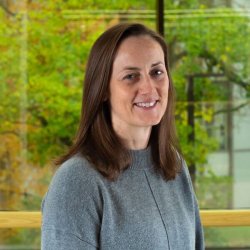
Prof. Ruth Baker
M.Math., D.Phil.
Pronouns
She / Her
Status
Academic Faculty
Professor of Applied Mathematics
Research groups
Address
Mathematical Institute
University of Oxford
Andrew Wiles Building
Radcliffe Observatory Quarter
Woodstock Road
Oxford
OX2 6GG
University of Oxford
Andrew Wiles Building
Radcliffe Observatory Quarter
Woodstock Road
Oxford
OX2 6GG
Highlighted publications
Travelling waves in a minimal go-or-grow model of cell invasion
Falcó I Gandia, C Crossley, R Baker, R Applied Mathematics Letters volume 158 (04 Jul 2024) Quantifying cell cycle regulation by tissue crowding
Falcó I Gandia, C Cohen, D Carrillo De La Plata, J Baker, R Biophysical Journal volume 124 923-932 (06 May 2024) Structural identifiability analysis of linear reaction–advection–diffusion processes in mathematical biology
Browning, A Tasca, M Falco, C Baker, R Proceedings of the Royal Society A: Mathematical, Physical and Engineering Sciences volume 480 issue 2286 (27 Mar 2024) Parameter identifiability and model selection for partial differential equation models of cell invasion
Liu, Y Suh, K Maini, P Cohen, D Baker, R Journal of the Royal Society Interface volume 21 (06 Mar 2024) A mathematical framework for the emergence of winners and losers in cell competition.
Pak, T Pitt-Francis, J Baker, R Journal of theoretical biology volume 577 111666-111666 (11 Nov 2023) A local continuum model of cell-cell adhesion
Falcó, C Baker, R Carrillo, J SIAM Journal on Applied Mathematics (29 Jun 2022) Efficient Bayesian inference for mechanistic modelling with high-throughput data.
Martina Perez, S Sailem, H Baker, R PLoS computational biology volume 18 issue 6 e1010191-e1010191 (21 Jun 2022) Quantifying the impact of electric fields on single-cell motility.
Prescott, T Zhu, K Zhao, M Baker, R Biophysical journal volume 120 issue 16 3363-3373 (Aug 2021) Prizes, awards, and scholarships
- Simons Investigator, Theoretical Physics in Life Sciences - 2024-2029
- Royal Society Wolfson Research Merit Award - 2017-2022
- Fellow of the Institute of Mathematics and Its Applications (FIMA) - 2021
- Fellow of the Royal Society of Biology (FRSB) - 2020
- Leverhulme Research Fellowship - 2017-2019
- London Mathematical Society Whitehead Prize - 2014
Recent publications
The influence of cell phenotype on collective cell invasion into the extracellular matrix
Yin, Y Waters, S Baker, R Bulletin of Mathematical Biology volume 88 issue 1 13 (26 Dec 2025) Exact identifiability analysis for a class of partially observed near-linear stochastic differential equation models
Browning, A Chappell, M Rahkooy, H Loman, T Baker, R (09 Dec 2025) Optimal experimental design for parameter estimation in the presence of observation noise
Qi, J Baker, R Mathematical Biosciences (27 Nov 2025) Mathematical modelling predicts novel mechanisms of stream confinement from Trail/Colec12/Dan in the collective migration of cranial neural crest cells
Johnson, S Kulesa, P Baker, R Maini, P Developmental Dynamics (07 Nov 2025) Optimal control in combination therapy for heterogeneous cell populations with drug synergies
Martina Perez, S Johnson, S Crossley, R Kasemeier, J Kulesa, P Baker, R Bulletin of Mathematical Biology volume 87 issue 11 (14 Oct 2025) Optimal control of immune checkpoint inhibitor therapy in a heart-tumour model
van der Vegt, S Baker, R Waters, S Bulletin of Mathematical Biology volume 87 issue 9 (11 Aug 2025) Modelling the impact of phenotypic heterogeneity on cell migration: a continuum framework derived from individual-based principles
Crossley, R Maini, P Baker, R Bulletin of Mathematical Biology volume 87 issue 9 (08 Aug 2025) Modeling cell differentiation in neuroblastoma: insights into development, malignancy, and treatment relapse
Martina Perez, S Heirene, L Kasemeier, J Kulesa, P Baker, R Journal of Theoretical Biology volume 614 (07 Aug 2025) Research interests
My research focuses on developing and applying novel mathematical, computational and statistical methodologies and modelling frameworks for investigating developmental biology systems at the cell and tissue level. I develop biologically realistic models that, used in tandem with experimental investigations, can provide fundamental insights into key biological mechanisms. An important aspect of my work is therefore multidisciplinary collaboration with theoreticians, life scientists and clinicians both within Oxford and further afield.


